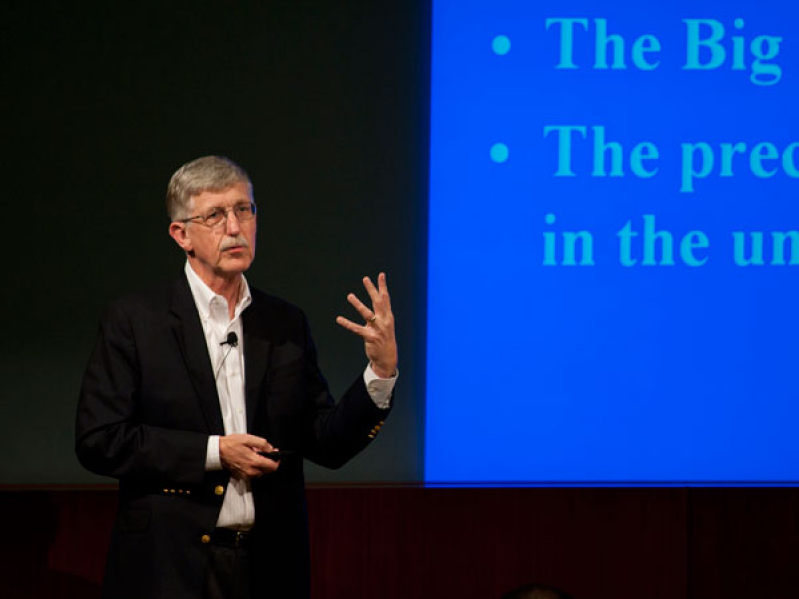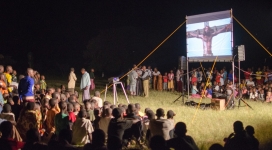
Outspoken evangelical geneticist Francis Collins revealed that combative atheist Richard Dawkins admitted to him during a conversation that the most troubling argument for nonbelievers to counter is the fine-tuning of the universe.
“If they (constants in the universe) were set at a value that was just a tiny bit different, one part in a billion, the whole thing wouldn’t work anymore,” said Collins, the director of the National Institutes of Health, during the 31st Annual Christian Scholars’ Conference at Pepperdine University in Malibu, Calif.
These constants regarding the behavior of matter and energy – such as strong and weak nuclear forces, gravity, and the speed of light – have to be precisely right during the Big Bang for life as we know it to exist.
“To get our universe, with all of its potential for complexities or any kind of potential for any kind of life form, everything has to be precisely defined on this knife edge of improbability,” said the world renowned scientist.
“That forces a conclusion. If you are an atheist, either it is just a lucky break and the odds are so remote, or you have to go to this multiverse hypothesis, which says that there must be almost an infinite number of parallel universes that have different values of those constants,” explained Collins to Christian scholars of various disciplines in the audience. “And of course we are here and so we must have won the lottery, we must be in the one where everything worked.”
There are some serious scientists in the world, however, such as English theoretical physicist and cosmologist Stephen Hawking, who believe in the multiverse hypothesis.
But it is “because the alternative is that you have to see the hands of a creator who set the parameters to be just so because the creator was interested in something a little more complicated than random particles,” Collins said.
The NIH director, who came to speak for himself and not as a government official, delivered a thoughtful yet provocative hour-and-a-half lecture last Thursday titled, “Reflections on the Current Tensions Between Science and Faith.” This year, the Christian Scholars’ Conference theme was: “The Path of Discovery: Science, Theology, and the Academy.”
More than 300 scholars from 90 different universities participated in the three-day conference, June 16-18, where they were challenged to discuss and engage with one another on the topic of faith and science. The scholars interacted through 91 paper, panel or performance sessions.
During the keynote presentation, speaker Francis Collins deliberated out loud about a question that the Big Bang theory cannot answer. Although the Big Bang theory explains how the universe started, it can’t explain what happened before that.
Collins said there are unending questions of “what happened before that” with scientific theories, but the only way to satisfactorily answer what happened at the very beginning is if something not limited by time is involved.
“A creator who is not limited by time, doesn’t need to have such a beginning,” Collins stated. “The question doesn’t make any sense if you have a creator outside of time.”
Creation and Evolution
Unlike most evangelicals, Collins said he never struggled between his acceptance of evolution and his Christian faith. When he looks at evolution, he thinks it is part of God’s elegant way of creation.
But 45 percent of Americans believe that the Earth is less than 10,000 years old. The Young Earth Creationism theory is “very incompatible” with what scientists have learned from physics, chemistry, cosmology, biology, and geology, emphasized Collins, who believes the Earth is over 13 billion years old.
He noted that even though billions of years sound long to humans, if God is outside of time then it might not seem long to God.
Collins also pointed out that when Darwin’s evolution theory was first introduced, there was not unanimous protest from the Church. Many Christians saw that as an explanation to how God created the world.
“God is the author of it all and we just learn something more about the how,” said Collins. “God is an awesome mathematician and physicist … God’s plan included the mechanism of evolution to achieve that, to create this marvelous diversity of living things on our planet.”
His view of evolution being a part of God’s creation plan is called theistic evolution, or another term is biologos. Bio is the Greek word for “life,” while Logos means “word.” So biologos would mean God speaking life into being.
Adam and Eve
Even more controversial than theistic evolution is Collins’ belief that Adam and Eve were not the only people on Earth. Looking at today’s genetic variations, there must have been an ancestral gene pool larger than that of just Adam (Eve, based on a literal reading of Genesis, came from Adam’s ribs and therefore would have the same DNA as Adam), somewhere in the range of 10,000 people.
“I can’t see how you get there by going through a bottleneck of a single individual,” contended Collins about present-day genetic variations. “You have to carry along variation and variation requires a population. This could not happen if you have just one person as the ancestor of all of humanity.”
The geneticist noted that scientists have been able to obtain the DNA of several Neanderthals and they are 99 percent identical to the human genome, said Collins. Moreover, where there is a region with sequence variation in the genome of Neanderthals, many times geneticists will find the same variation in humans today.
So this is convincing evidence that Neanderthals and human have a relationship and that our founding population was thousands of individuals and not one person, Adam.
“So I think you can preserve the idea of a literal, historical couple (Adam and Eve) as long as you don’t try to say they were the only humans and we are all descended from just them,” contended Collins. “That second part science won’t support.”
The former director of the Human Genome Project said based on genetic research, it is impossible to support the belief that people today all came from only Adam.
Another benefit of accepting that there were thousands of people besides Adam and Eve is being able to answer questions from the Bible like: Where did Cain find his wife? Who was Cain afraid would kill him? How was Cain going to build a city with just his family?
“People in the world are hearing you can’t have both. It has got to be one or the other,” said Collins about choosing between science and creation. “The essential thing is we’re about the truth. A faith that basically asks people to disbelieve facts is not about the truth. If there are aspects about our Christian faith that has gone down that road, it is up to all of us to try to pull that back.
“Look at the facts, look at the truth, and in the process, admire all the more and worship all the more God the creator. But in the nonessential things, let’s not get too worked up about those options about Adam and Eve as long as they’re consistent with the facts.”
For Collins, a key principle he uses to harmonize science and his Christian faith is based on a famous statement by former New York Sen. Patrick Moynihan: “You are entitled to your own opinion, you are not entitled to your own facts.”
“I think we are also rather engaged with that view that when it comes to these issues of science and faith, we are wide open to options and opinions about how it all fits together as long as we recognize there are certain facts that do have to be dealt with,” said Collins. “Facts about the Bible and facts about science.”
Pepperdine University’s annual Christian Scholars’ Conference seeks to bring scholars together from higher education institutions from all academic disciplines to nurture an intellectual and Christian community through scholarly dialogue and collaboration.







